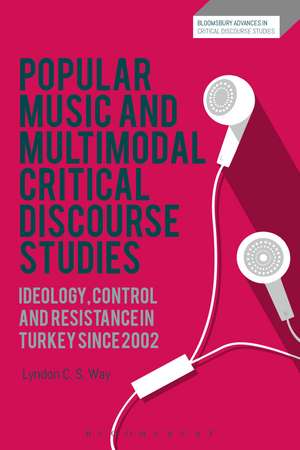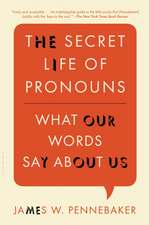Popular Music and Multimodal Critical Discourse Studies: Ideology, Control and Resistance in Turkey since 2002: Bloomsbury Advances in Critical Discourse Studies
Autor Dr Lyndon C. S. Wayen Limba Engleză Hardback – 27 dec 2017
| Toate formatele și edițiile | Preț | Express |
|---|---|---|
| Paperback (1) | 229.96 lei 6-8 săpt. | |
| Bloomsbury Publishing – 26 iun 2019 | 229.96 lei 6-8 săpt. | |
| Hardback (1) | 773.39 lei 6-8 săpt. | |
| Bloomsbury Publishing – 27 dec 2017 | 773.39 lei 6-8 săpt. |
Preț: 773.39 lei
Preț vechi: 1112.67 lei
-30% Nou
Puncte Express: 1160
Preț estimativ în valută:
148.01€ • 152.90$ • 123.18£
148.01€ • 152.90$ • 123.18£
Carte tipărită la comandă
Livrare economică 26 martie-09 aprilie
Preluare comenzi: 021 569.72.76
Specificații
ISBN-13: 9781350016446
ISBN-10: 1350016446
Pagini: 216
Dimensiuni: 156 x 234 x 22 mm
Greutate: 0.5 kg
Editura: Bloomsbury Publishing
Colecția Bloomsbury Academic
Seria Bloomsbury Advances in Critical Discourse Studies
Locul publicării:London, United Kingdom
ISBN-10: 1350016446
Pagini: 216
Dimensiuni: 156 x 234 x 22 mm
Greutate: 0.5 kg
Editura: Bloomsbury Publishing
Colecția Bloomsbury Academic
Seria Bloomsbury Advances in Critical Discourse Studies
Locul publicării:London, United Kingdom
Caracteristici
Provides a valuable bridging function between Multimodal Critical Discourse Studies and Popular Music Studies by applying methods of the former to issues of concern to both the former and the latter
Notă biografică
Lyndon C. S. Way is Lecturer in the Department of Communication and Media, School of the Arts, at the University of Liverpool, UK.
Cuprins
1. Introduction 2. Approaches to the study of music and meaning3. Difficult relations: Music, politics and authenticity4. Turkey under the stewardship of AKP5. Political parties and pop6. Concerts as multimodal communication7. Music videos against government policies8. Online music in social movements9. Politics in social media about music10. Final notesReferencesIndex
Recenzii
In an era of global democratic decline where fundamental liberties are at risk nor only outside by also increasingly within the West, a detailed study into how opposing voices can be expressed in creative outlets makes this study a very valuable one with implications that go beyond the Turkish case . Overall, [this book] does a fine job of analysing multimodal sources from different discursive sites in exploring the different ways in which such expression takes place.
The critical study of musical discourse has only just begun. If it is now getting a new impetus, this is to a large extent due to the pioneering work of Lyndon Way, both in an edited book based on a symposium at CADAAD 2014 in Budapest ... and in his new book.
Through his sophisticated and subtle theoretical approach, Lyndon Way offers us a meticulous and nuanced account of the relationship between music and politics. He does so by concentrating on the fascinating case of Turkey, but his insights help illuminate many other instances of the complex interplay of song and sentiment. He makes video images, performances, social media and lyrics part of his story, but he never lets us forget the most crucial element of all: the sound itself.
Music has always been political. It can powerfully support the powerful and equally powerfully unite people against them in protest. Never more so than in contemporary Turkey, and Lyndon Way reports from the field, making us experience the politics and the music close up, but also analyzing astutely how political music works - in political advertisements, videos and concerts, and with images, words and, above all, music itself.
Lyndon Way has produced a valuable study which is of interest not only in terms of its particular focus - politicised music in Turkey - but also for its theoretical contribution to the emerging field of Multimodal Critical Discourse Studies. Multimodal methods should be helpful to undergraduate and postgraduate students who want to take a broad approach to the critical study of music in general and politicised popular music in particular. Meanwhile, those who have little or no prior knowledge of Turkish music and politics will learn a great deal from this enjoyable and thought-provoking text.
The critical study of musical discourse has only just begun. If it is now getting a new impetus, this is to a large extent due to the pioneering work of Lyndon Way, both in an edited book based on a symposium at CADAAD 2014 in Budapest ... and in his new book.
Through his sophisticated and subtle theoretical approach, Lyndon Way offers us a meticulous and nuanced account of the relationship between music and politics. He does so by concentrating on the fascinating case of Turkey, but his insights help illuminate many other instances of the complex interplay of song and sentiment. He makes video images, performances, social media and lyrics part of his story, but he never lets us forget the most crucial element of all: the sound itself.
Music has always been political. It can powerfully support the powerful and equally powerfully unite people against them in protest. Never more so than in contemporary Turkey, and Lyndon Way reports from the field, making us experience the politics and the music close up, but also analyzing astutely how political music works - in political advertisements, videos and concerts, and with images, words and, above all, music itself.
Lyndon Way has produced a valuable study which is of interest not only in terms of its particular focus - politicised music in Turkey - but also for its theoretical contribution to the emerging field of Multimodal Critical Discourse Studies. Multimodal methods should be helpful to undergraduate and postgraduate students who want to take a broad approach to the critical study of music in general and politicised popular music in particular. Meanwhile, those who have little or no prior knowledge of Turkish music and politics will learn a great deal from this enjoyable and thought-provoking text.





















